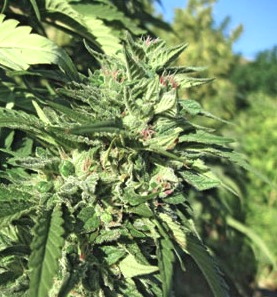Note to Colleagues in the Society of Cannabis Clinicians From Stephen S. Robinson, MD, MPH, April 2, 2015
I’m writing to request your assistance in aiding a patient referred to me by one of the cannabis testing labs. The patient is a redheaded, blue eyed* 26 y.o. female with a history of multiple allergies to chocolate, pollens, bees, sulfites, apples, adhesives, avocados. Contact with any of these items results in outbreaks of hives, facial and pharyngeal edema and headaches.
When she was 16, she had to be taken to the ER after her first experience smoking cannabis resulted in respiratory distress. After the acute treatment, she said subsequent scratch testing with liquid THC (?marinol) confirmed that she was allergic to cannabis.
She has abstained from any contact with cannabis until 3 years ago when she met her boyfriend who later became her fiancé. Although she maintains her abstinence from cannabis, he is a long-time cannabis patient. She states that after he medicates, even casual contact with any of his bodily fluids results in contact urticaria. Needless to say this has had devastating consequences on their relationship.
If any of you have any experience in this area, or, know of any clinicians who do, please contact me.
* The patient was told by one of her physicians that people with those characteristics tended to be more susceptible to allergies. I’ve never seen the patient, and didn’t have time to confirm that piece of information.
Dr. Robinson attached a paper on the subject of Cannabis Allergy by immunologists Thad L. Ocampo, MD; and Tonya S. Rans, MD. It concludes:
Although still relatively uncommon, allergic disease associated with C sativa exposure and use has been reported with increased frequency. Allergic reactions and even anaphylaxis attributed to C sativa have been noted with sensitization associated with pollinosis, Cannabis use, potential plant cross-reactivity, and occupational exposure. With state laws allowing medical and in some cases recreational use of marijuana, there is a growing potential for legitimate personal and commercial exposure. The evolving legal status of C sativa, its highly prevalent use throughout the world, and the varied forms in which it is used could translate into its growing role as a clinically relevant allergen that might be encountered.
Crude extracts have been used in different in vivo and in vitro testing methods to demonstrate the immunologic nature of these cases. However, the lack of standardized extracts limits validation and widespread applicability of such diagnostic testing. Much research is still needed to more definitively define pertinent allergens, develop a standardized extract, establish diagnostic sensitivity and specificity, and clarify treatment options for clinically affected Cannabis-allergic patients.





